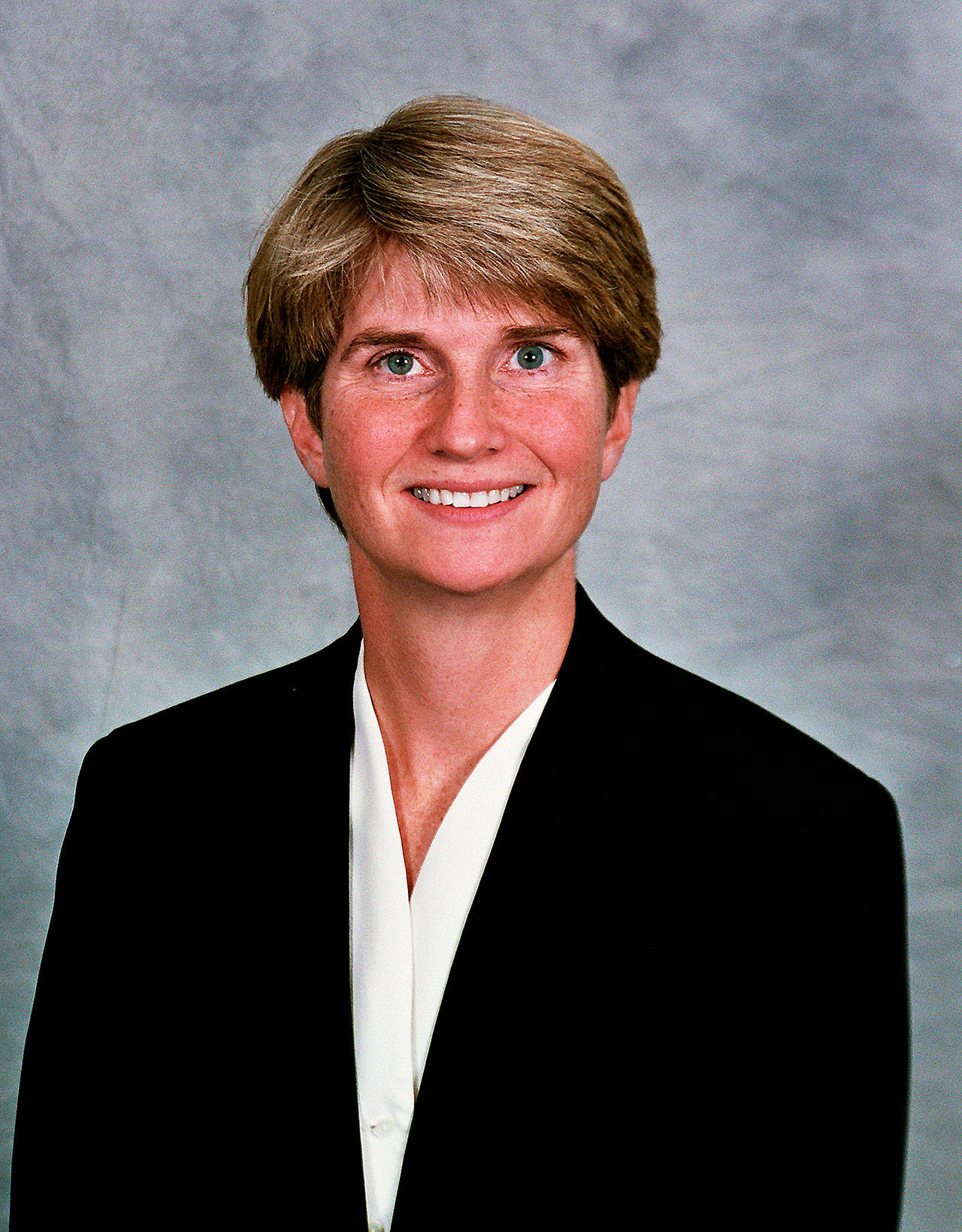For students who visited the Dominican Republic with Rotary Club of Everett members, spring break was a fun and educational chance to help others. One chaperone, Snohomish County Superior Court Judge Janice Ellis, came home with more than trip photos or a sunburn.
Ellis, 57, is back at work, but still recovering from a serious back injury suffered at 27 Waterfalls of Damajagua, a tourist destination in the Caribbean island nation.
Jumping into a pool at the falls, Ellis damaged a vertebra. Her injury, which could have caused paralysis, meant surgery after her return home. She now wears a corset-style TLSO (thoracolumbosacral orthosis) brace that helped her fly home safely before surgery at Seattle’s Swedish Medical Center.
The waterfalls were an optional stop on the week-long Rotary trip that included six local kids. Most were high school students in the Everett School District’s AVID (Advancement Via Individual Determination) program, which fosters college readiness.
“It’s kind of a natural water park,” said Everett Police Capt. Greg Lineberry, a Rotary member who also was a trip chaperone. At 27 Waterfalls, a cascading river carved slides and pools from limestone. “You can jump off cliffs into pools, or go through chutes and channels,” Lineberry said.
The heart of the trip was service to the people of Dajabon, on the Dominican Republic’s border with Haiti. For three years, the Everett Rotary has had a garden project there. Locals grow food to help their families and sell at markets.
After arriving April 1, students visited the capital city of Santo Domingo, founded in 1496 by the brother of Christopher Columbus. They stopped at Peace Corps headquarters in Santo Domingo, and toiled several days in the gardens.
They were housed in a dorm at a Jesuit boarding school. “It was so cool to see these kids making friends with kids in the community,” Ellis said.
Ellis said Thursday that it was her idea to visit the waterfalls, a commercial attraction where helmets and life jackets are used. She jumped into one pool intending to go in feet-first. “I landed badly,” she said, describing how she entered the water in a sitting position.
She couldn’t stand. With feeling in her fingers and toes — “a good thing” — Ellis said she thought she had a back spasm. She could kneel, but the pain was excruciating.
She was helped by Lineberry and others to a hotel room. A day before they were supposed to fly home, she couldn’t sit up.
Ellis said her smartest move had been buying trip insurance, for $66. When she called the insurance carrier about likely missing her flight home, the first question was “Have you seen a doctor?”
At an emergency room in Centro Medico Cabarete, a hospital in the city of Cabarete, she had X-rays and an MRI. She learned from a neurosurgeon, Dr. Robert Spitale, that her T12 vertebra was crushed. There was bone debris in her spinal column, which Ellis said increased the risk of catastrophic injury.
Lineberry and the others had to return home without her.
What followed was a flurry of phone calls. Dr. Tom Stonecipher, an Everett orthopedic surgeon, viewed emailed images of tests she’d had. He consulted another neurosurgeon. She was told her back was stable enough to travel — if she had a TLSO brace. There wasn’t one available where she was.
Ellis said it took heroic efforts of Everett physical therapist Betsy Baker-Bold and Kim McQueen, a prosthetist and orthotist with the Hanger Clinic, to get a brace custom-made on the East Coast. Using string, Ellis had taken her own measurements.
The custom brace was sent overnight to Sea-Tac International Airport. Rachel Ellis, the judge’s 25-year-old daughter, delivered it by flying to the Dominican Republic to help her mother fly home. A nurse, sent by the travel insurance company, accompanied them.
Through Judge Linda Krese, Ellis’ friend and Superior Court colleague, contact was made with Dr. Jens Chapman, a spine specialist at the Swedish Neuroscience Institute. By April 14, Ellis was at the Seattle hospital, after three flights — from the Dominican Republic to Newark, New Jersey, then to San Francisco, and finally to Sea-Tac.
On April 15, the Saturday before Easter, Dr. Chapman performed her surgery. With bone fragments, Ellis said, he built up her T12 vertebra, which he attached to vertebrae above and below it with screws. She might have gone without the surgery, but that likely would have meant an increasingly stooped stance.
During recovery, Ellis said she was helped at home by her daughter, her 20-year-old son, and her brother-in-law, “a great cook.” She worked half-days before returning full-time to the bench.
Incredibly, Ellis participated May 7 in a 10K walk in Snohomish. She’s not one to dwell on a bleak picture of what might have been, had the injury been worse. Instead, she is grateful for all who helped in her time of need.
Ellis said she had never met McQueen, who “worked some amazing magic and got that brace made.” McQueen later stopped by Swedish hospital to wish her well.
“The whole trip was reflective of how we, as a society, say, ‘I can help.’ There are so many caring people,” Ellis said.
Julie Muhlstein: 425-339-3460; jmuhlstein@heraldnet.com.
Talk to us
> Give us your news tips.
> Send us a letter to the editor.
> More Herald contact information.




























